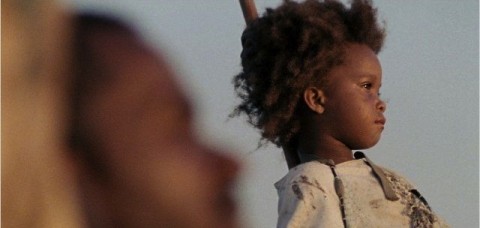There was talk, back a week or so ago, about the perfect Father’s Day movie. Some made jokes about That’s My Boy , others took the opportunity to reassert the paternal themes across the work of Wes Anderson, including his latest, Moonrise Kingdom . I couldn’t help thinking, watching Beasts of the Southern Wild , a dreamy, boisterous, folk-inflected allegory of American independence and its foes, among other things, that for a certain type of father and daughter, at least, the story of a benevolent universe-ruler named Hushpuppy (Quvenzhané Wallis) and her willful dad Wink (Dwight Henry) would unleash the floodgates like no other. If you’ve ever attempted to prepare for your own death at your father’s hands by leaving a record for the future excavators of history, you might agree. But then Hushpuppy’s circumstances are so unique that they could only be hers; Hushpuppy’s world is the world. The success of this exuberant, affecting debut feature from director Benh Zeitlin depends on his ability to universalize the particular, in this case by drawing us into the perspective of a six-year-old girl living in squalor and feeling and uncertainty in the Louisiana bayou, then telling our own story from behind it. That story is rich enough to accommodate a number of thematic inscriptions, including American class and ideological disparities, moral philosophies of prosperity and independence, environmental imbalance and Katrina-esque catastrophe, and, perhaps most indelible, reckoning with our inevitable visit from the goon squad. Though she scrawls a cave-drawing version of her own imminent fate (death by very, very angry dad) after setting her trailer ablaze in a fit of don’t-ignore-me pique, Beasts details young Hushpuppy’s confrontation with her father’s mortality. Like Where the Wild Things Are ’s Max (more specifically in Spike Jonze’s adaptation), she has a single parent, in this case an unstable and ailing man trying to instill self-sufficiency in his daughter before his time runs out. What Hushpuppy sees, variously and with a level, absorbent gaze, is a bully, a crank, a king, a madman, a playmate, and a scary dad. Like everything else, she imagines his illness as her doing, and assumes that when he goes he will take the world with him. Both Wallis and Henry are non-professionals plucked from the local environs, each personifying — along with a supporting cast of outsiders and eccentrics —the toughness of spirit that keeps their characters at the center of a very specific universe, come what storms and tusked beasts may. Beasts was shot on location, though its marshy, water-veined bayou setting is more of a frame for the starkly imagined habitat of Hushpuppy and her father. They live among the animals; sometimes they eat with them, sometimes they eat them. In the earthy, ethereal opening sequence, Hushpuppy searches for the heartbeat of various creatures, holding some up to her ear like a seashell, piecing together a collective rhythm. For her heartbeats have a soothing effect; others have their own ideas. The sailor Hushpuppy meets on the water, after she and a coterie of dirty-limbed girls attempt to swim out to the light believed to be her mother, says it’s the smell of chicken biscuits that makes him feel “cohesive.” At times it feels like not much holds this world together; at others it seems nothing could possibly tear it apart. Zeitlin and cinematographer Ben Richardson create a sense of coherent near-chaos with constant, searching camerawork. They shoot from the hip, literally — life as seen from a little person’s point of view — with the wobbly, watchful intensity of a young girl just getting her sea legs. At the same time that we see the world as Hushpuppy does, we take in the tenuousness of her existence with apprehension. At first the romantically appointed poverty and dissipation may set off a certain wariness; the marshalling of filth and decay as the authentic counterpoint to sleek, self-alienated lives. And indeed, the group’s violent evacuation to a shelter following a storm’s devastating flood feels too easy, a false note in an otherwise nuanced and persuasive evocation of stubborn iconoclasm. That Hushpuppy’s perspective eventually swallows and uplifts the movie is the happy result of an uncommonly sensitive screenplay (adapted from Lucy Alibar’s play Juicy and Delicious by Alibar and Zeitlin) and the staging of a climax whose transcendence removes all doubt that we are in the hands of a confident, exceptionally lyrical filmmaker. Wink calls his daughter the king and the boss lady, commands her to eat crab like a beast, admonishes her when she jumps from a catfish’s sting, and drills into her the idea that she should never, ever cry. The latter feels like a nod to Beasts ’s own vulnerability to sentiment. Instead, with the help of a tough-bodied little girl too fantastically of the earth to fall prey to the preternatural, it strikes upon actual, unforgettable emotion. Follow Michelle Orange on Twitter . Follow Movieline on Twitter .

See the original post here:
REVIEW: Beasts of the Southern Wild Lives Up to Its Moral Universe


























Leave a Reply